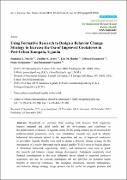| dc.contributor.author | Martin, Stephanie L. | |
| dc.contributor.author | Arney, Jennifer K. | |
| dc.contributor.author | Mueller, Lisa M. | |
| dc.contributor.author | Kumakech, Edward | |
| dc.contributor.author | Walugembe, Fiona | |
| dc.contributor.author | Mugisha, Emmanuel | |
| dc.date.accessioned | 2020-11-12T08:05:17Z | |
| dc.date.available | 2020-11-12T08:05:17Z | |
| dc.date.issued | 2013 | |
| dc.identifier.citation | Martin, S. L., Arney, J. K., Mueller, L. M., Kumakech, E., Walugembe, F., & Mugisha, E. (2013). Using formative research to design a behavior change strategy to increase the use of improved cookstoves in peri-urban Kampala, Uganda. International journal of environmental research and public health, 10(12), 6920-6938. | en_US |
| dc.identifier.uri | https://hdl.handle.net/123456789/204 | |
| dc.description.abstract | Household air pollution from cooking with biomass fuels negatively
impacts maternal and child health and the environment, and contributes to
the global burden of disease. In Uganda, nearly 20,000 young children die of household air
pollution-related pneumonia every year. Qualitative research was used to identify
behavioral determinants related to the acquisition and use of improved cookstoves
in peri-urban Uganda. Results were used to design a behavior change strategy for the
introduction of a locally-fabricated top-lit updraft gasifier (TLUD) stove in Wakiso district.
A theoretical framework—opportunity, ability, and motivation—was used to guide
the research and behavior change strategy development. Participants consistently cited
financial considerations as the most influential factor related to improved cookstove
acquisition and use. In contrast, participants did not prioritize the potential health
benefits of improved cookstoves. The theoretical framework, research methodology,
and behavior change strategy design process can be useful for program planners and 6921
researchers interested in identifying behavioral determinants and designing and evaluating
improved cookstove interventions. | en_US |
| dc.language.iso | en | en_US |
| dc.publisher | International journal of environmental research and public health | en_US |
| dc.subject | household air pollution | en_US |
| dc.subject | indoor air pollution | en_US |
| dc.subject | improved cookstoves | en_US |
| dc.subject | behavioral change | en_US |
| dc.subject | formative research | en_US |
| dc.subject | qualitative research | en_US |
| dc.subject | health technology | en_US |
| dc.subject | theoretical framework | en_US |
| dc.subject | Uganda | en_US |
| dc.title | Using Formative Research to Design a Behavior Change Strategy to Increase the Use of Improved Cookstoves in Peri-Urban Kampala, Uganda | en_US |
| dc.type | Article | en_US |

